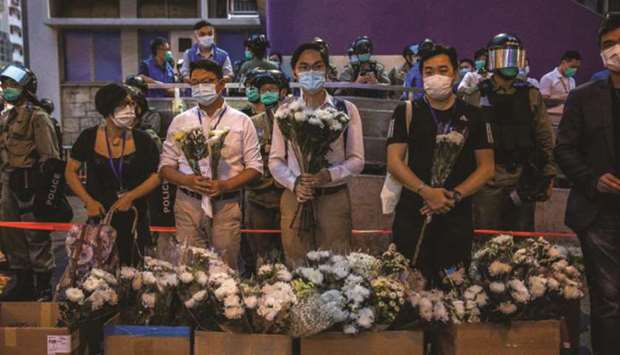The Hong Kong government has dismissed US President Donald Trump’s threat to strip Hong Kong of its special status in response to Beijing’s vote to implement national security laws in the territory.
In a statement released Saturday night, a government spokesman said Trump’s claim that Hong Kong has lost its autonomy from Mainland China “was completely false and ignored the facts on the ground”.
Beijing is set to impose national security laws on Hong Kong’s behalf targeting “treason, sedition, terrorism, and foreign interference.”
Rights groups and pro-democracy politicians say the law is likely to be used to silence dissent in the city, where anti-government protests have persisted over the past year. US politicians have consistently backed initiatives meant to deter Beijing from interfering in Hong Kong’s internal affairs.
However, officials in Beijing and Hong Kong have stated that neither sanctions nor the revocation of the territory’s special status will prevent Beijing from imposing national security laws.
The spokesman said the Hong Kong government “note(s) with deep regret that President Trump and his administration continue to smear and demonise the legitimate rights and duty of our sovereign to safeguard national security, ... which in turn is aimed at restoring stability to Hong Kong society”. The territory’s Justice Secretary Teresa Cheng said that Beijing’s unprecedented move to bypass Hong Kong’s internal legislature to implement the resolution “in no way” violated the ‘one country, two systems’ formula as US officials alleged.
Trump said that the US response would “affect the full range of agreements we have with Hong Kong,” including the territory’s special trade status – a long-standing economic pillar in the global financial hub.
Hong Kong Financial Secretary Paul Chan told Chinese state media that the territory’s economy would not be seriously affected by the loss of its special trade status or sanctions, as the government had contingency plans in place.
However, the United States has consistently been Hong Kong’s most robust trading partner, maintaining a trade surplus of $297bn from 2009 to 2018. US-owned offices in the city employed more than 188,000 people in 2015 according to the Office of US Trade Representative.
The government statement highlighted Hong Kong’s increasing regional trade with economies of the South-East Asian Asean bloc, while downplaying trade with the US.
The spokesman said that though sanctions would “lead to a breakdown of the mutually beneficial” relationship, the government was not worried by such threats as it could also rely on the advantages brought about by opening to the mainland China’s economy. Secretary for Security John Lee stated Saturday that the actions of Beijing and Hong Kong’s government were in line with Hong Kong’s constitution – a claim that has been disputed by the territory’s pro-democracy lawmakers and the Hong Kong Bar Association.
The pro-democracy group Demosisto asked the international community to follow the US in taking “real steps to punish Beijing”. Prominent Demosisto activist Joshua Wong said “we encourage more international allies to stand with Hong Kong.
Actions speak louder than words. Apart from issuing statements to oppose the national security law, more important is also to enhance different kinds of tools to put pressure on Beijing”. Ousted pro-democracy lawmaker Nathan Law said that though such responses may impact Hong Kong residents as well as the pro-Beijing government, that the consequences of the law’s enactment would be far worse.
“If we do nothing and the national security law is implemented in Hong Kong, that would be the most nightmarish outcome,” he said.

Police personnel (back) stand guard outside Prince Edward MTR underground train station as people wait to collect flowers from passersby during a vigil for protesters who were injured during police arrests on August 31, 2019.
